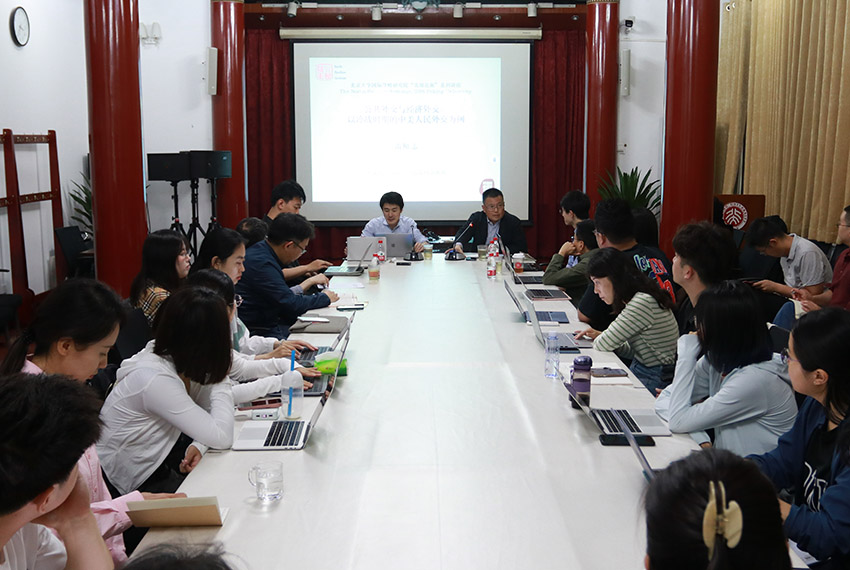On May 24, 2024, the Institute of International and Strategic Studies (IISS), Peking University (PKU) hosted a series of lectures under the 77th "North Pavilion Seminar", titled "Public Diplomacy and Economic Diplomacy: The Case of People’s Diplomacy between China and the U.S. during the Cold War". The lecture was delivered by Minami Kazushi, Associate Professor at the School of International Public Policy, Osaka University, Japan, and was chaired by Prof. Yu Tiejun, President of IISS, PKU.

Associate Professor Minami Kazushi gave the lecture based on his newly published book in 2024, People's Diplomacy. He began by highlighting the significant shift in China-U.S. relations in the 1970s. While governmental leaders of both countries laid out the blueprint for China-U.S. relations, they could not fundamentally change the relations overnight. It was ultimately the people of China and the U.S. who shaped these relations. People’s diplomacy was crucial, not because it altered the foreign policies of the two countries, but because it fundamentally transformed the nature of China-U.S. relations. In the 1970s, China-U.S. relations extended far beyond governmental relations. During the seven years from Nixon's visit to China to the establishment of diplomatic relations between the two countries, thousands of Chinese and Americans engaged in multi-channel exchanges and cooperation, improving mutual understanding and laying the groundwork for the development of China-U.S. relations.
Next, he emphasized that both China and the United States underwent profound social changes in the 1970s. To understand China-U.S. relations of this period more deeply, it is necessary to combine the perspectives of diplomatic history and social history, focusing on the domestic social dynamics in both countries in areas such as foreign trade, science and technology, education, tourism, sports, and culture, and how they influenced people-to-people exchanges. For instance, in the field of tourism, tens of thousands of Americans visited China in the 1970s as tourists, hoping to understand Chinese socialism and explain it to Americans. Their perceptions of China were closely tied to the conditions of American society. During the 1970s, many Americans were dissatisfied and uneasy about American society, while the spiritual outlook of the Chinese people during the same period led American visitors to form a very positive view of China.
Finally, he concluded that people’s diplomacy is significant for understanding contemporary China-U.S. relations. In the 1970s, China-U.S. "engagement" was not a policy formulated by the governments of the two countries but a gradually formed notion among their peoples —that maintaining cooperation, rather than mutual hostility, was in the fundamental interests of both countries, even when faced with seemingly insurmountable differences. Although the current intergovernmental relations between China and the United States may face new challenges, most people in both countries still hold this view. Therefore, there may be no need to be overly pessimistic about the future of China-U.S. relations.
During the comment and Q&A session, Associate Professor Minami Kazushi engaged with faculty and students on topics such as the interplay between people-to-people exchanges and bilateral relations, the distinctions between concepts like "people's diplomacy" and "cultural exchange," the factors influencing the effectiveness of people-to-people exchanges, and how to improve China-U.S. relations through such exchanges today. (Contributed by: Chen Danmei)
Editor: Li Fangqi Photographer: Zheng Peijie

